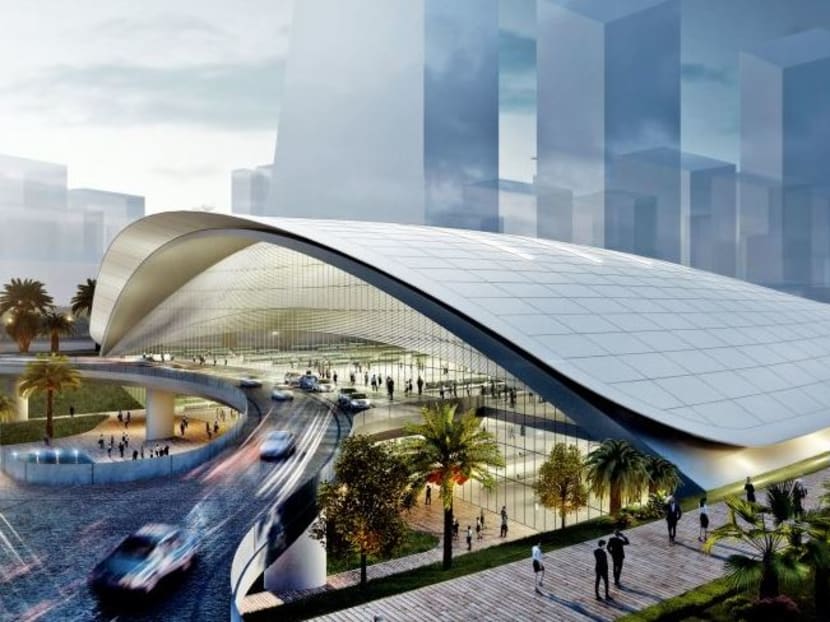Decision to scrap KL-S’pore HSR is 'final', says Mahathir
KUALA LUMPUR — Malaysia is scrapping the multi-billion-dollar Kuala Lumpur-Singapore High-Speed Rail project as part of drastic cuts to government spending and investment that are required for the country to “avoid being declared bankrupt”, Prime Minister Mahathir Mohamad said on Monday (May 28). “One of the most important priorities of course is the financial situation of the country,” he told the Financial Times.
KUALA LUMPUR — Malaysia is scrapping the multi-billion-dollar Kuala Lumpur-Singapore High-Speed Rail project as part of drastic cuts to government spending and investment that are required for the country to “avoid being declared bankrupt”, Prime Minister Mahathir Mohamad said on Monday (May 28).
“One of the most important priorities of course is the financial situation of the country,” he told the Financial Times.
“We need to do away with some of the unnecessary projects, for example the high-speed rail, which is going to cost us RM110 billion (S$37 billion) and will not earn us a single cent. That will be dropped.”
Speaking later at a press conference, Dr Mahathir described Malaysia's decision to scrap the HSR project as "final".
"But it will take time because we have an agreement with Singapore. We have to talk to Singapore," he said, adding that he did not know if Singapore had been officially informed of Malaysia's decision.
"It's not beneficial, it's going to cost us a huge sum of money. We'll make no money at all from it. It is only a short track. It is only going to save one hour by taking the HSR."
Asked if there was a penalty that Malaysia would have to pay for withdrawing from the agreement, he added: "I was told it is almost 500 million ringgit. I have yet to verify (the currency) but I suppose it is Malaysian (ringgit).
“We will try to manage it at the least cost possible."
A Singapore Ministry of Transport spokesman said Singapore has not yet received any official notification from Malaysia on the cancellation of the deal.
"We had agreed to proceed with the HSR project based on mutual benefits and obligations set out in the HSR bilateral agreement," the spokesman added.
"We will wait for official communication from Malaysia.”
The 350km rail deal, inked under former prime minister Najib Razak in 2016, is out for tender and is scheduled to be completed by 2026.
It will cut the travelling time between Kuala Lumpur and Singapore to 90 minutes, from about four hours by car.
It had been touted by leaders from both sides of the Causeway as a game-changer that could bring about closer ties between the two countries and their peoples.
Dr Mahathir, who returned to office earlier this month after his scandal-hit predecessor Datuk Seri Najib was ousted in an unprecedented election defeat for the ruling party, also promised to slash spending on government departments and reduce civil-service allowances that were “bloated” in an effort to boost Mr Najib’s flagging support.
Mr Lim Guan Eng, the new finance minister, said last week that total government debt, including liabilities from the corruption-ridden 1MDB fund, had spiralled to more than RM1.09 trillion, 80 per cent of gross domestic product. Mr Najib has always denied any wrongdoing.
Investors are concerned that Dr Mahathir’s government will struggle to curb debts while implementing populist campaign pledges to drop highway tolls, increase fuel subsidies and abolish the goods and services tax, which was set to generate US$12 billion (S$16 billion) or a fifth of state revenues this year.
“Democracy means changes and pressures all the time and sometimes we have to do things to meet the people’s desires rather than what is right,” he said.
His mission to reform Malaysia will be even tougher because the civil service has been tainted, according to Dr Mahathir, who said he would sack 17,000 political appointees.
“The worst part of it is that the machinery of government has been corrupted and we have to rely on that corrupt machinery because we can’t dismiss everybody,” he said.
During his first stint as prime minister from 1981 to 2003, Dr Mahathir was praised for bringing stability and prosperity to this South-east Asian nation of 31 million people but also attacked for his autocratic style and tolerance of cronyism.
He refused on Monday to admit to any major past mistakes, and said that this government would follow the rule of law and honour existing contracts, as it tries to resolve its fiscal dilemmas.
The 92-year-old, who has agreed to hand over power to former opposition leader Anwar Ibrahim within two years, added that Malaysia would also talk to the Chinese government about renegotiating “unequal treaties”, including the Chinese-backed US$14 billion East Coast Rail Link.
He said that many large projects and government agencies set up by Datuk Seri Najib were “not necessary at all”.
“Mostly it was about trying to make the prime minister popular and it cost billions of dollars,” he said.
To prevent such abuses in future, he promised to implement campaign pledges to repeal draconian security laws and strengthen parliamentary oversight so that one person could not dominate the system in the way that Datuk Seri Najib did or that critics accuse Dr Mahathir of doing in the past.
“It will not be a kleptocratic government, certainly, it will be a more democratic country,” he said. FINANCIAL TIMES










